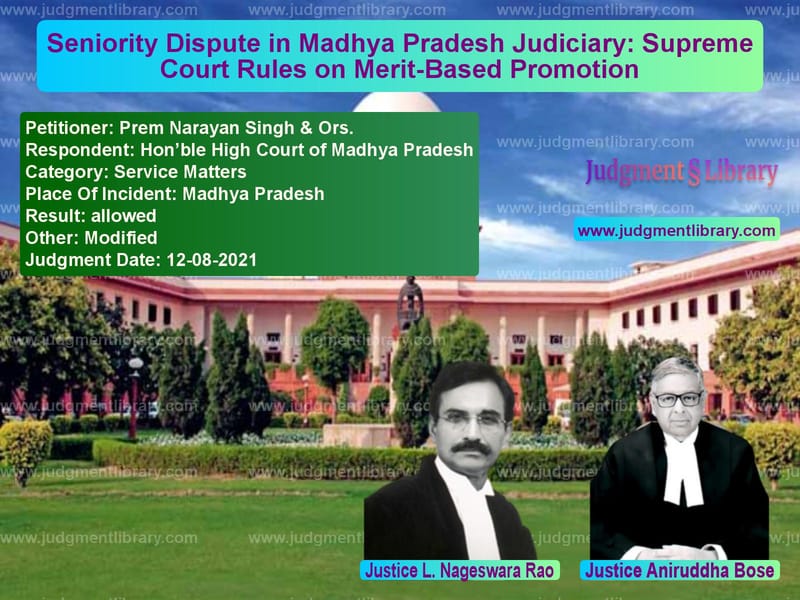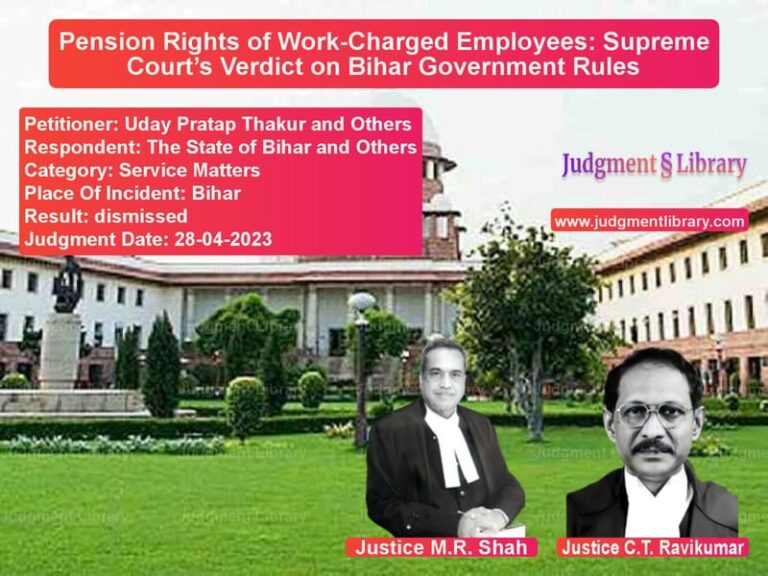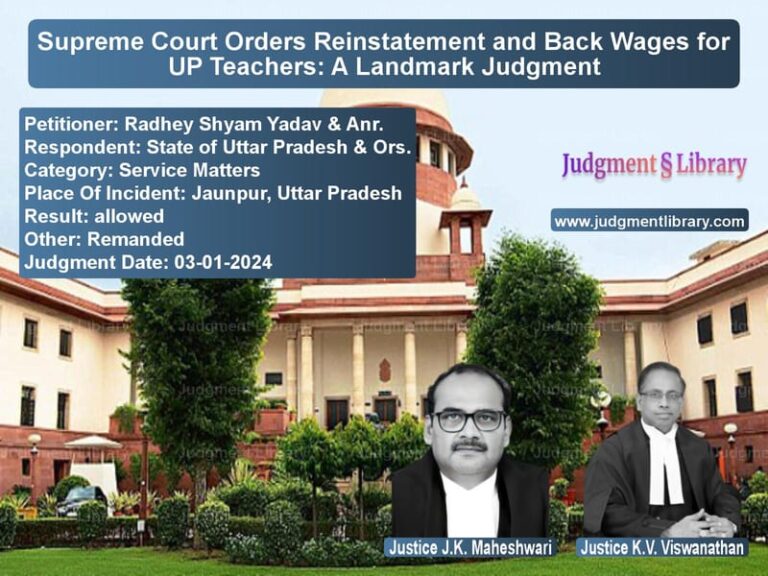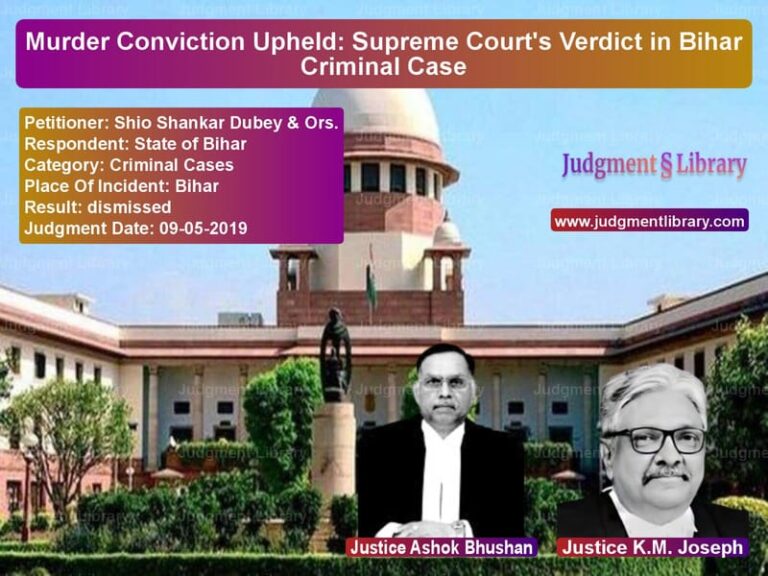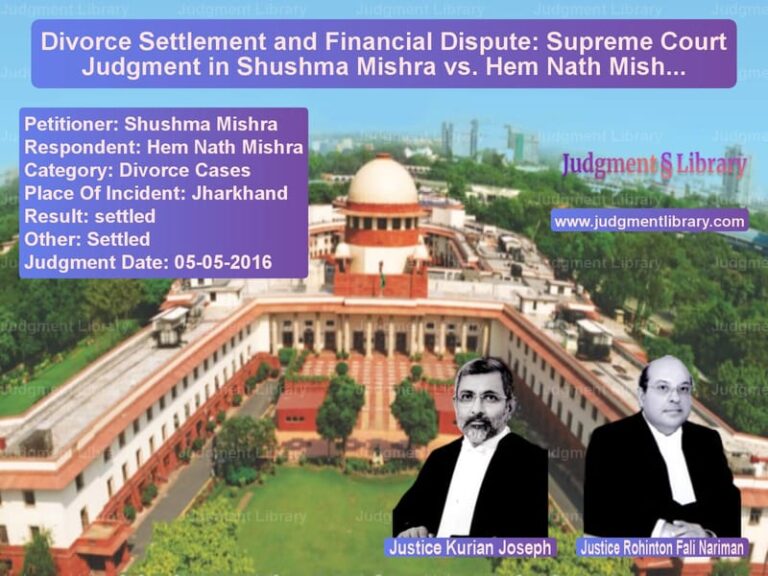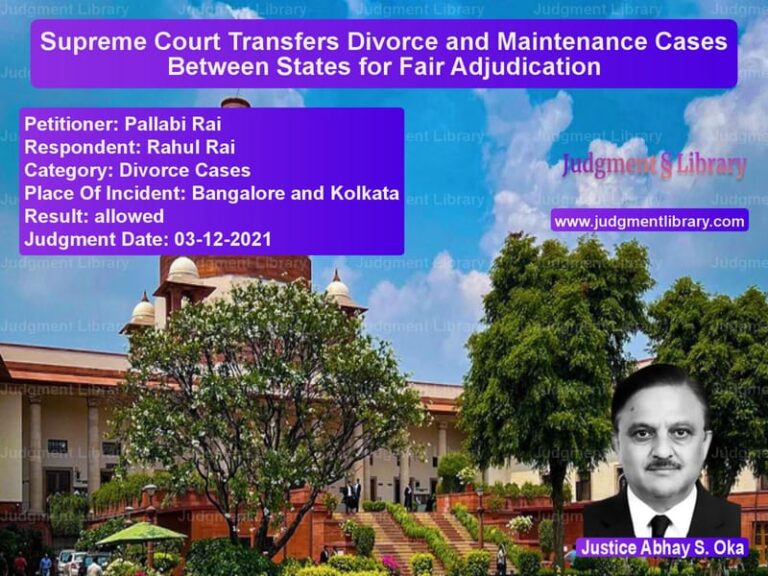Seniority Dispute in Madhya Pradesh Judiciary: Supreme Court Upholds High Court’s Decision
The dispute over inter-se seniority between direct recruits and promotees in the Madhya Pradesh Higher Judicial Services led to two significant writ petitions being filed before the Supreme Court. The petitioners, who were appointed as District Judges through direct recruitment, sought to challenge amendments to seniority rules and the methodology employed in determining their standing in the judiciary. The Supreme Court, however, dismissed the petitions, upholding the decision of the Madhya Pradesh High Court.
Background of the Case
The matter involved Writ Petition (C) No. 675 of 2018 and Writ Petition (C) No. 997 of 2020. The petitioners sought to quash the amendment made on June 8, 2005, to the Madhya Pradesh Uchchtar Nyayik Sewa (Bharti Tatha Seva Sharten) Niyam, 1994, and the subsequent order dated October 27, 2015, by which the High Court of Madhya Pradesh determined the seniority of District Judges. The petitioners also requested that the 2017 Rules be given retrospective effect, arguing that they had been adversely affected by the delay in their implementation.
The core issue revolved around the High Court’s decision to grant seniority to promotees through the Limited Competitive Examination (LCE) over directly recruited District Judges. This decision had a significant impact on the career progression of the petitioners, leading them to seek relief from the Supreme Court.
Arguments of the Petitioners
The petitioners, who were directly recruited as District Judges, presented several arguments against the amendments:
- The amendments to the seniority rules unfairly favored promotees through the LCE, thereby diminishing the standing of direct recruits.
- The High Court’s application of seniority rules was inconsistent with the principles laid down in All India Judges’ Association v. Union of India, which emphasized a roster-based system.
- The delay in implementing a proper seniority structure should not disadvantage direct recruits, and the 2017 Rules should be applied retrospectively.
- The High Court erred in applying the date of appointment as the basis for seniority rather than the roster system mandated by the Supreme Court.
Arguments of the Respondents
The Madhya Pradesh High Court, represented by its counsel, defended its decision on the following grounds:
- The amendments were made in compliance with the Supreme Court’s directives and were necessary to maintain balance in the judiciary.
- The delay in implementing the changes was due to the pending litigation regarding the Y.D. Shukla case, which had a direct bearing on the issue.
- In the absence of explicit rules governing inter-se seniority, it was reasonable to rely on the date of appointment.
- The 2017 Rules were meant to be prospective in nature and could not be applied retroactively, as that would create further complications.
Supreme Court’s Analysis and Ruling
After reviewing the arguments, the Supreme Court ruled against the petitioners. The key observations from the judgment include:
- The Supreme Court acknowledged the delay in amending the rules but held that this alone did not justify a retrospective application of the 2017 Rules.
- It stated, “The delay in the decision taken by the High Court to bring the seniority rule in accord with the directions given by this Court in All India Judges’ Association on the ground of pendency of SLP before this Court is not justified.”
- However, it clarified that “the petitioners are not entitled to the relief of the 2017 Rules being given retrospective effect.”
- It upheld the principle that, in the absence of clear rules governing inter-se seniority, the date of appointment could be used as a valid criterion.
- The Court agreed with the Madhya Pradesh High Court’s reliance on Rule 12(1) of the Madhya Pradesh Civil Services (General Condition of Service) Rules, 1961, for determining inter-se seniority.
- The Court emphasized, “In the absence of any rule for determining inter-se seniority of direct recruits and promotees, the date of appointment/promotion can be taken into account for fixing seniority.”
The judgment reinforced the principle that objections to the mode of seniority determination must be raised at the appropriate stage and cannot be introduced during appellate proceedings.
Conclusion
The Supreme Court’s dismissal of both writ petitions reaffirmed that, while delays in implementing seniority rules should be avoided, retrospective application cannot be imposed unless explicitly provided for. The ruling effectively upheld the Madhya Pradesh High Court’s approach to resolving seniority disputes in the Higher Judicial Services, ensuring that established principles of judicial service governance remain intact.
With this decision, the Supreme Court clarified that the direct recruits would have to abide by the seniority list issued by the High Court, reinforcing the authority of the judiciary in managing its internal administrative matters.
Petitioner Name: Anand Kumar Tiwari & Ors..Respondent Name: High Court of Madhya Pradesh & Ors..Judgment By: Justice L. Nageswara Rao, Justice Aniruddha Bose.Place Of Incident: Madhya Pradesh.Judgment Date: 12-08-2021.
Don’t miss out on the full details! Download the complete judgment in PDF format below and gain valuable insights instantly!
Download Judgment: anand-kumar-tiwari-&-vs-high-court-of-madhya-supreme-court-of-india-judgment-dated-12-08-2021.pdf
Directly Download Judgment: Directly download this Judgment
See all petitions in Promotion Cases
See all petitions in Recruitment Policies
See all petitions in Public Sector Employees
See all petitions in Judgment by L. Nageswara Rao
See all petitions in Judgment by Aniruddha Bose
See all petitions in dismissed
See all petitions in supreme court of India judgments August 2021
See all petitions in 2021 judgments
See all posts in Service Matters Category
See all allowed petitions in Service Matters Category
See all Dismissed petitions in Service Matters Category
See all partially allowed petitions in Service Matters Category

